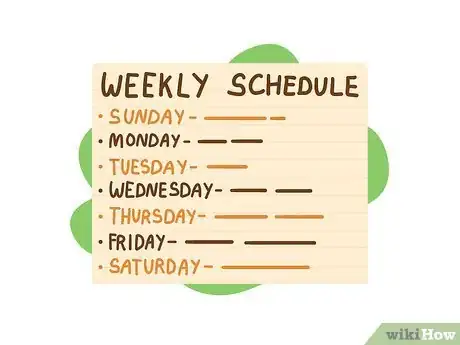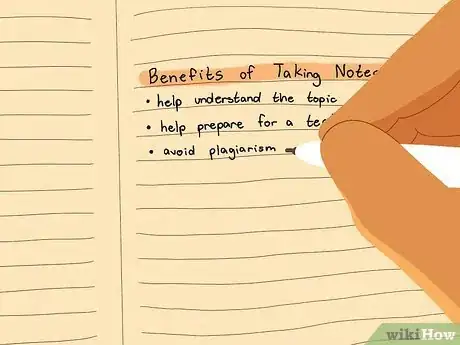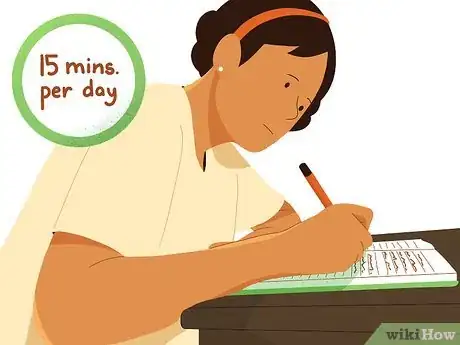This article was co-authored by Jennifer Kaifesh and by wikiHow staff writer, Hannah Madden. Jennifer Kaifesh is the Founder of Great Expectations College Prep, a tutoring and counseling service based in Southern California. Jennifer has over 15 years of experience managing and facilitating academic tutoring and standardized test prep as it relates to the college application process. She takes a personal approach to her tutoring, and focuses on working with students to find their specific mix of pursuits that they both enjoy and excel at. She is a graduate of Northwestern University.
There are 14 references cited in this article, which can be found at the bottom of the page.
This article has been viewed 116,696 times.
If your grades are slipping or your parents are pressuring you to do better in school, you might be looking to make a change. While doing well might look different for every student, studying hard and doing your best in every class are good goals to strive toward. Even if you’ve fallen a bit behind, you can always pull yourself up to success with some motivation, discipline, and support.
Steps
Succeeding Academically
-
1Make a schedule of everything you need to do. Keep track of everything you need to do for all of your classes, then make a plan to finish them. Write everything down in a daily planner or make weekly to-do lists, then check off each assignment once it’s done.[1]
- Don't wait until the day before a test or when a paper's due to get started. Give yourself your own mini deadlines so that you spread out your work into manageable chunks.
- For example, give yourself the goal of writing one or two pages of a paper a day. Plan in advance a day to revise the paper before it's due. Give yourself a day to study each section of material that will be on the test.
-
2Take harder classes to challenge yourself if you’re bored. If you find yourself falling behind in your classes because you just don’t care, they might be too easy for you. Take Honors or AP classes if your school offers them, and do a few extracurricular activities for an even bigger challenge.[2]
- Taking harder classes also looks better on your report card, especially if you’re applying for colleges soon.
Advertisement -
3Motivate yourself by thinking about the future. One of the best predictors of success in college is success in high school, which is why taking your academics seriously in high school is such a big deal. The best motivation for putting more effort into your schooling is to never let yourself forget how much it will impact your future. Practically, this means thinking carefully about the courses you take and why you're taking them, being diligent about setting aside time to study regularly, and starting to look into colleges early, even before it's time to start applying.[3]
- When it's time to start applying for colleges, don't wait until the last minute! Get in on that early registration.
-
4Ask your teachers or guidance counselors for help if you need it. Teachers and guidance counselors are there for your benefit, so use them! If you're struggling with an essay, go to your teacher after class and ask if you can talk about it. If you're not sure what to study for an upcoming history class, find a time when your teacher isn't busy to ask for help. Go to your school's guidance counselor when you need help deciding what classes to take, getting on track to pursue a certain career, or choosing a career path in the first place.[4]EXPERT TIPJennifer Kaifesh is the Founder of Great Expectations College Prep, a tutoring and counseling service based in Southern California. Jennifer has over 15 years of experience managing and facilitating academic tutoring and standardized test prep as it relates to the college application process. She takes a personal approach to her tutoring, and focuses on working with students to find their specific mix of pursuits that they both enjoy and excel at. She is a graduate of Northwestern University.Academic Tutor

 Jennifer Kaifesh
Jennifer Kaifesh
Academic TutorOur Expert Agrees: If you're struggling in a class, talk to your teacher to better understand why your grades don't reflect your knowledge and effort. They may be able to help you find the source of the problem. For instance, you may just be studying terms solely to memorize them when your teacher expects you to understand how to apply them, or your teacher might be basing exam questions more on the textbook than the in-class lectures.
Studying Effectively
-
1Take good notes during class. If you don’t have good notes, you won’t be able to study! Try to pay attention during class time and jot down key concepts so you can go back and look at them later. If your teacher writes something down on the board or emphasizes it, it’s probably important.[5]
- Keep all of your notes, tests, and quizzes organized by subject so you can review them later on.
-
2Pick a quiet area without any distractions. If you’re studying at home, pick out a quiet area where you can’t see the TV. Turn your phone on airplane mode and try to stay off social media while you work to get the most out of your study session.[6]
- If studying at home is too distracting, try going to a library or a coffee shop nearby.
-
3Create a study schedule to get into the habit of studying every day. Start by studying for 10 to 15 minutes at a time every day. Try to study around the same time each day to keep yourself in the habit when tests and quizzes come along.[7]
- For example, you could do 15 minutes of studying every day after dinner.
- Or, try studying for 10 minutes right when you get home from school.
-
4Explain the material in your own words to really make it stick. Find a friend or a study partner and ask them if you can “teach” them some material. Try to explain the concepts you’re learning to someone who has never heard of them before. As you teach out loud, you can test your own understanding of the subject as well.[8]
- Let your friend ask questions, too. If you can answer the questions, great! If not, go back and study a little more.
-
5Use practice tests and flashcards to mix things up. Memorizing your notes can be a little tedious! Try to engage with your work by testing yourself with a practice test, making and using flashcards, summarizing a chapter of your textbook in your own words, or writing down connections between different topics and concepts. These methods help you retain information better than simple memorization.[9]
Balancing Other Parts of Your Life
-
1Socialize with your friends, but don’t let them distract you. Although having a social life is an important part of a well balanced life, you need to think carefully about whether maybe your friends, or boyfriend or girlfriend, are keeping you from performing the best you can in school. If they are, try to limit the amount of time you spend with friends every week.[10]
- If your social life is lacking and it's causing you stress or sadness, make a conscious effort to reach out more to the people you do know and like. Making friends isn't always easy, but with a little confidence and effort, it can be done.
-
2Explore interests outside of academics and socializing. This could be a sport, volunteering, doing student council, or joining a club. Not only do these look good on college and job applications, but they can be super fun, too![11]
- If your school doesn't offer anything that you're interested in, look around at your local community center.
-
3Make time for your family. Your family is your number one support group, and they most likely will be there to help and support you for the majority of your life. So, it's very much worth it to try to keep a good relationship with them. Of course, not everyone's relationship with their family is the same, but making an effort to help and spend time with your parents and siblings will pay off in the long run, in a multitude of ways.[12]
- Parents can help you with homework, give you advice on how to deal with a difficult teacher or peer, give you emotional support when you need it, and help you choose the right classes and career path.
- Siblings can help bolster your social life, give you studying advice, and, if they're older and went to the same school as you, they can even let you know what to expect from certain teachers.
-
4Focus on what you’re learning, not on your grades. Although good grades are a part of doing well in school, it's important to remember not to get too caught up in your grades. A "B" in a difficult class in which you learned a lot is so much better than an "A+" in an easy class that won't benefit you much in the long run.[13]
-
5Reach out for mental health support if you need to. School is a fairly high pressure environment, and that can cause stress and anxiety which will hinder your chances of success, and reduce your quality of life overall. The most important step when it comes to managing anxiety is to ask for help, from your parents, teachers, and councilor. Reach out when the stresses of school get too heavy, and don't try to battle them alone.[14]
- Cultivate positive mindsets to help manage anxiety. For example, don't think that paper you're working on as incomplete, but rather a work in progress. Instead of always focusing on how much left you have to learn, take some time to reflect on how far you've come.
Learning Virtually or Remotely
-
1Set up an organized learning space to do your classes. If you have space in your home, set up a desk with your computer, a notebook, and a few writing utensils. Try to use this space every time you have class or need to study to get more into “school mode.”[15]
- You could also try bringing your laptop to a library or a coffee shop nearby.
-
2Get rid of any distractions so you can focus. Turn your phone on airplane mode and exit out of any distracting tabs on your computer. Try to focus like you would in a classroom environment so you can really buckle down and do some work.[16]
- If you’re having a tough time limiting your internet use, try using a website blocker like Cold Turkey or Freedom. An application like this will block distracting websites for a certain amount of time.
- Some people can listen to music while they work, but others can’t. You can decide for yourself what works best.
-
3Set boundaries with your friends and family members. Just because you’re at home doesn’t mean you’re free to hang out. Let your close friends and family members know that you’re going to be busy during class time, so they should let you have some peace and quiet.[17]
- You might also have to ask your siblings to keep it down while you’re in class so you can pay attention.
-
4Interact with your teachers and classmates online. Your participation style might depend on what application your teacher is using for your class. Make sure you’re commenting on discussion posts, asking questions during class time, and talking to your fellow classmates if you feel stuck.[18]
- If your class often meets via a video chat, it might be nice to keep your camera on. That way, your teacher can see that you’re paying attention while they’re talking.
-
5Email your teacher if you’re struggling or have any questions. Remote and virtual learning comes with its own set of challenges, like slow wifi, computer updates, and broken technology. If you’re having any trouble at all, be sure to let your teacher know right away.[19]
- Many teachers will be flexible about problems like these since they’re out of your control.
- This is especially important if you’re having trouble during an online test or exam.
-
6Socialize outside of school. Online school can feel a little isolating since you aren’t seeing your friends every day. If you can, try to make plans with your friends once a week to hang out and get some social interaction.[20]
- Extracurricular activities are also great for meeting new people! Join a sports team, a club, or a youth group in your area.
- If you can’t see your friends in person, try talking via video chat or FaceTime instead.
References
- ↑ https://www.forbes.com/sites/kevinkruse/2015/11/09/time-management-students/?sh=6ae309b76a4c
- ↑ https://www.edweek.org/education/opinion-what-students-truly-mean-when-they-say-theyre-bored-and-what-to-do-about-it/2020/09
- ↑ http://www.aft.org/periodical/american-educator/spring-2004/its-time-tell-kids-if-you-dont-do-well-high
- ↑ https://kidshealth.org/en/kids/studying.html
- ↑ https://kidshealth.org/en/kids/studying.html
- ↑ https://learningcenter.unc.edu/tips-and-tools/studying-101-study-smarter-not-harder/
- ↑ https://learningcenter.unc.edu/tips-and-tools/studying-101-study-smarter-not-harder/
- ↑ https://learningcenter.unc.edu/tips-and-tools/studying-101-study-smarter-not-harder/
- ↑ https://www.openpolytechnic.ac.nz/current-students/study-tips-and-techniques/study-skills/active-learning
- ↑ https://news.illinois.edu/blog/view/6367/205995
- ↑ https://news.illinois.edu/blog/view/6367/205995
- ↑ http://kidshealth.org/parent/growth/learning/school-help-teens.html#
- ↑ http://kidshealth.org/parent/growth/learning/school-help-teens.html#
- ↑ https://hbr.org/2012/12/nine-ways-successful-people-de
- ↑ https://www.understood.org/en/school-learning/choosing-starting-school/home-schooling/questions-to-ask-about-online-schools-a-printable-checklist
- ↑ https://www.understood.org/en/school-learning/choosing-starting-school/home-schooling/questions-to-ask-about-online-schools-a-printable-checklist
- ↑ https://www.unh.edu/student-life/study-tips-covid-19
- ↑ https://www.northeastern.edu/graduate/blog/tips-for-taking-online-classes/
- ↑ https://thebestschools.org/features/best-ways-succeed-online-education/
- ↑ https://www.greatschools.org/gk/articles/virtual-schools/
About This Article
To do well in high school, actively engage with what you're studying by drawing idea maps or debating topics with a friend. You should also try to get in the habit of having regular study sessions as opposed to cramming everything in the night before your exams. Additionally, manage your time effectively by creating a to-do list so you don't end up working on an assignment the night before. At the same time, try to spend time with friends outside of school in order to destress. For tips on when to ask for help and how to make time for your family, keep reading!
































-Step-12.webp)

















































